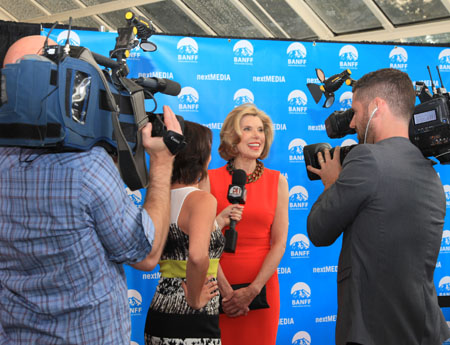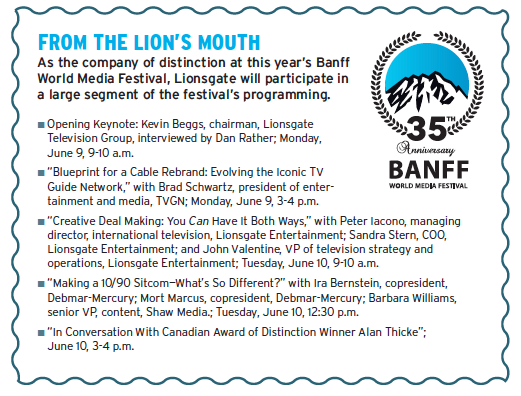A 35-Year Rocky Mountain High

The smarter way to stay on top of broadcasting and cable industry. Sign up below
You are now subscribed
Your newsletter sign-up was successful
When Barbara Williams made her first trip to what was then called the Banff World Television Festival, the event was exclusive to Canadians—and not very many Canadians.
“It was a lot smaller 20 years ago,” says Williams, who was a self-described “newbie broadcaster” at the time, and today serves as senior VP of content for Shaw Media. “There was a quarter of the delegates that we have now.”
This week, the Banff World Media Festival, which kicked off June 8, celebrates its 35th anniversary edition, and it is no longer a locals-only party. The festival will feature as keynote speakers not only Kevin Beggs, television group chairman for Canadianrooted Lionsgate, which is this year being honored as the festival’s company of distinction; but also Eileen O’Neill, group president of Discovery, Science and Velocity networks; and Farah Ramzan Golant, CEO of British TV production group All3Media.
It is also no longer a gathering strictly for folks in the television industry. The widening overlap between television and digital video platforms, and the near vanishing of any line separating the two, is reflected in the festival’s makeup.
“Twenty years ago it was all about television in its simplest form—what came on Tuesdays at 8,” says Williams, who is a member of the festival’s board of directors. “It was a much simpler time. Whereas today, the festival encapsulates not only the hundreds of TV channels that there are, but also all the other platforms and the big emphasis on digital. So it’s a much richer, more complex festival now than it used to be.”
In that sense, the Banff event reflects this richer, more complex nature of the TV business. Williams credits the festival’s location—in a remote town in the Canadian Rocky Mountains, adjacent to a national park—for creating an atmosphere in which delegates have a rare opportunity to mix with the highest-level executives. Having creators and executives from the digital side so well-represented and in such close proximity to traditional media has led, according to Williams, to a progressive attitude that has fueled the festival’s growth.
“It’s changed the conversations, and I think in a very important way,” Williams says. “I think the festival has needed to be forward-thinking and needed to provide a way for people to have those conversations around what’s new, what isn’t and where we are going.”
The smarter way to stay on top of broadcasting and cable industry. Sign up below
Looking toward where the industry—and, by extension, Banff—is going is a focus of much of this year’s programming. An anniversary reception will close out the festival the evening of June 11. But the rest of the events will be forward-facing, according to Ferne Cohen, executive director for the festival.
“While we are grateful to have this party and have the opportunity to reflect on where Banff has been, we’re taking the opportunity for the theme this year to say, ‘Wow, it’s been great for the last 35 years. What will the next 35 years look like?’” Cohen says. “So many of our big sessions will have that component to it. People will walk away saying, ‘Wow, Banff is really poised to be a great platform for the next 35 years as well.’”
In Like a Lion
Many of those sessions will involve Lionsgate executives and talent. As this year’s company of distinction—an honor the festival bestowed last year for the first time, on CBS—Lionsgate will be represented in several panels, master classes and one-on-ones throughout the festival.
The ascendance of Lionsgate’s TV operations has mirrored Banff’s own growth. Beggs joined Lionsgate in 1998, when the company was only a few months old.
“We were charged initially with taking advantage of our Canadian pedigree and domicile and finding ways that we could add value as producers and financiers of television shows,” with a focus on drama series, Beggs says. “It was a very important time in the Canadian TV landscape, because costs were escalating, international sales figures for U.S. TV, scripted, was waning, and people were looking for tax advantages and financial advantages to justify some of the budget pricing that was going on. So we put our shingle out.”

Under Beggs, the Lionsgate television group’s revenue grew from $8 million in 2000 to just under $500 million in 2013. The company’s signature current series include Mad Men, NurseJackie and Orange Is the New Black. Lionsgate and its Debmar-Mercury division pioneered the 10/90 model of comedy sales, in which the company produces 10 episodes of a series and provides them to the network at low cost under an agreement that requires the net to pick up 90 additional episodes if certain ratings thresholds are met. The 10/90 model has been used with Tyler Perry’s TBS comedies and FX’s Anger Management. Lionsgate also holds a 50% stake in cable network TVGN, co-owned by CBS.
Beggs compares the company’s recent push into content for digital platforms—such as Netflix’s Orange Is the New Black and Hulu’s Deadbeat—to the success that it found as cable networks began to find bigger and bigger success with original scripted series such as USA’s The Dead Zone, which Lionsgate coproduced with Paramount.
“I see that exact same phenomenon happening at a much faster timetable than the growth of cable scripted that started in the late-’90s,” Beggs says. “So far, knock on wood, we’ve had success.”
Lionsgate’s success “is self-evident,” according to Cohen. “They have digital, kids, scripted, unscripted, they produce for network, they produce for cable, they produce for platforms like Hulu and Netflix, they do some straightto- digital Internet Web stuff. I think they just sort of illustrate with the utmost success how a company needs to stay current.”
Everything Lionsgate does, Cohen adds, provides “an example of how to stay current and how to diversify and be innovative to be successful. And I like to think of Banff as being diverse like that as well.”
